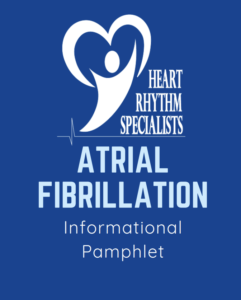What is Atrial Fibrillation?
Atrial fibrillation (AFib) is a type of heart arrhythmia (irregular heartbeat) in which the two upper chambers (the atria) of the heart beat irregularly and out of coordination with the rest of the heart. This causes a disruption of the blood flow to the ventricles and the rest of the body.
How is AFib Diagnosed?
Dr. Yoo will use a combination of a physical exam, medical history, and testing, which may include:
- electrocardiogram (ECG/EKG)
- Holter monitor
- event monitor
- echocardiogram
- stress test
- implantable loop recorder
Risk Factors include:
- older age
- being male
- family history of AFib
- history of heart attack(s), heart disease, heart defects, or heart disorders
- history of heart surgery thyroid conditions obesity lung disease diabetes
Causes of AFib include:
- stimulants, such as medications,
caffeine, tobacco, or alcohol - stress due to surgery,
pneumonia, or other illnesses - viral infections
- high dose steroid therapy
- high blood pressure
- conditions such as sleep apnea,
sick sinus syndrome, and
metabolic syndrome
Symptoms of AFib
Symptoms of AFib may last anywhere from a few minutes to a few days, and some people have
no symptoms at all. Signs and symptoms may include:
- palpitations
- weakness, fatigue, or reduced
ability to exercise - chest pain (angina)
- shortness of breath
- lightheadedness or dizziness
- fainting (syncope)
- confusion
Treatments for AFib
Dr. Yoo will determine the type of treatment necessary based on the frequency of your episodes and the symptoms they cause. Treatment may include procedures such as a cardioversion, an ablation, or a left atrial appendage closure, along with lifestyle changes such as:
- eating a healthy diet
- regular exercise
- maintaining a healthy weight
- stopping smoking
- limiting alcohol and caffeine
Additional Resources
